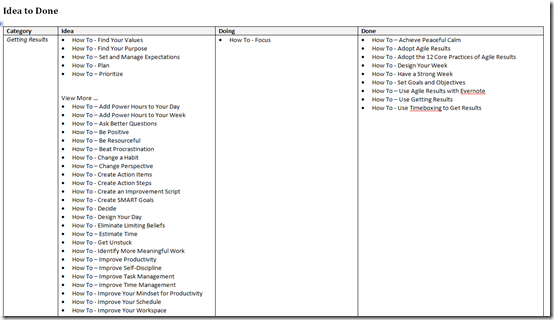Idea to Done: How I Use a Personal Kanban for Getting Results
I’ve been using personal Kanbans for several years, thanks to early guidance from Corey Ladas. In fact, the first time I used a personal Kanban was back in 2004 to “pull” a set of high-demand How To articles for .NET Security.
The beauty of the Kanban is it scales up and down, from an individual to a team. I’ve used Kanbans to help shape process, drive clarity and shift from “push” to “pull”, and to eliminate bottlenecks in terms of shipping stuff on time and on budget. I’ve also used them to improve quality, and to push quality checks up stream, where they are cheaper to deal with. But for my personal Kanban, it’s just a simple way to stay motivated, see the work that needs to be done, and to easily avoid biting off too much as the same time.
“Idea to Done” Board
One of my favorite ways to create a personal Kanban is to create a very simple “Idea to Done” board.
The sample above is a personal Kanban I use to drive creating How Tos for Getting Results the Agile Way. It consists of three columns:
- Idea
- Doing
- Done
The thing to keep I mind with a Kanban is to achieve two primary goals:
- Visualize the work / workflow.
- Reduce open work.
Word or PowerPoint for Personal Kanbans (“Pages” and “One-Sliders”)
I usually create my personal Kanban in either Word or PowerPoint, so that it’s easy to update and share, wherever I go. While I prefer whiteboards and stickies for team Kanbans, I’ve found that a single slide deck in PowerPoint, or a simple page in a Word doc works wonders. I’ve tried little portable whiteboards and mini-stickies, but that just dioesn’t work for me over time. If it’s a Kanban I can leave at home, then a whiteboard and stickies works great, because I love the visual impact and the ease of use.
My main goal is to see at a glance, “To Do”, “Doing,” and “Done.” If the demand is not that clear, I call it “Ideas.” If I have a lot of clarity, I call it “To Do.” Sometimes I keep the lists separate, depending on how much I have. I stay flexible in my approach.
The key to effectiveness with a personal Kanban ultimately comes down to how well it helps you “flow” value. If you keep that in mind, then that’s a good way to keep refining your approach, until you find what works for you.
Comments
Anonymous
February 28, 2012
Hi JD Thanks for sharing! I like the idea of using an application that you already have for your Personal Kanban a lot. I've been using Personal Kanban for a couple of years now, and I've used many types and flavours myself, from traditional whiteboards with stickies to pretty much any surface that's available - even a kitchen tray. ;) One of my simplest was a Notepad Kanban, with items moving from sections for To Do, to Doing and Done. This was for a conference workshop I was doing with somebody. We were using Dropbox to share files. Notepad was the one app we both had and could quickly open without having to learn a new tool/board. Sometimes the simplest solutions really are the best. Regards, Maritza van den HeuvelAnonymous
February 28, 2012
The comment has been removed
